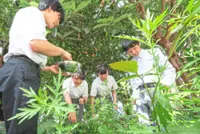A POWERFUL explosion rattled the windows of a community centre in eastern Ukraine, cutting through the silence as a group of teenagers drew at their desks.
“That’s a glide bomb,” Bogdan Masliy, a 15-year-old, said casually without looking up.
Follow us on our official WhatsApp channel for breaking news alerts and key updates!
Thank you for your report!





